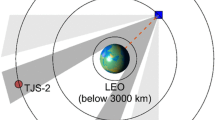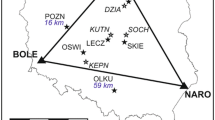Summary
The signals transmitted by Block II satellites of the Global Positioning System (GPS) can be degraded to limit the highest accuracy of the system (10 m or better point positioning) to authorized users. This mode of degraded operation is called “Selective Availability” (S/A). S/A involves the degradation in the quality of broadcast orbits and satellite clock dithering. We monitored the dithered satellite oscillator and investigated the effect of this clock dithering on high accuracy relative positioning. The effect was studied over short 3-meter and zero-baselines with two GPS receivers. The equivalent S/A effects for baselines ranging from 0 to >10,000 km can be examined with short test baselines if the receiver clocks are deliberately mis-synchronized by a known and varying amount. Our results show that the maximum effect of satellite clock dithering on GPS double difference phase residuals grows as a function of the clock synchronization error according to: S/A effect =0.04 cm/msec, and it increases as a function of baseline length like: S/A effect =0.014 cm/100 km. These are equations for maximum observed values of post-fit residuals due to S/A. The effect on GPS baselines is likely to be smaller than the 0.14 mm for a baseline separation of 100 km. We therefore conclude, for our limited data set, and for the level of S/A during our tests, that S/A clock dithering has negligible effect on all terrestrial GPS baselines if double difference processing techniques are employed and if the GPS receivers remain synchronized to better than 10 msec. S/A may constitute a problem, however, if accurate point processing is required, or if GPS receivers are not synchronized. We suggest and test two different methods to monitor satellite frequency offsets due to S/A. S/A modulates GPS carrier frequencies in the range of-2 Hz to +2 Hz over time periods of several minutes. The methods used in this paper to measure the satellite clock dither could be applied by the civilian GPS community to continuously monitor S/A clock dithering. The monitored frequencies may aid high accuracy point positioning applications in a postprocessing mode (Malys and Ortiz 1989), and differential GPS with poorly synchronized receivers (Feigl et al. 1991).
Similar content being viewed by others
References
Beutler, G., W. Gurtner, I. Bauersima, and R. Langley (1985), Modeling and estimating orbits of GPS satellites,Proceedings of the First Symposium on Precise Positioning with the Global Positioning System, 99–112.
Blewitt, G. (1989) Carrier phase ambiguity resolution for the Global Positioning System applied to geodetic baselines up to 2000 km,J. Geophys. Res., 94, 10187–10203.
Feigl, K.L, R.W. King, T.A. Herring and M. Rothacher (1991), A scheme for reducing the effect of Selective Availability on precise GPS carrier phase measurements,Geophys. Res. Lett., 18, 1289–1292
Malys, S. and M. J. Ortiz (1989), Geodetic absolute positioning with differenced GPS carrier beat phase data,Proceedings of the Fifth Symposium on Precise Positioning with the Global Positioning System, 487–499.
Van Dierendonk, A. J., S. S. Russel, E.R. Kopitzke, and M. Birnbaum (1980), The GPS Navigation Message,Navigation, special issue on GPS, Vol. 1, 55–73.
Author information
Authors and Affiliations
Rights and permissions
About this article
Cite this article
Rocken, C., Meertens, C. Monitoring selective availability dither frequencies and their effect on GPS data. Bulletin Géodésique 65, 162–169 (1991). https://doi.org/10.1007/BF00806345
Received:
Accepted:
Issue Date:
DOI: https://doi.org/10.1007/BF00806345




